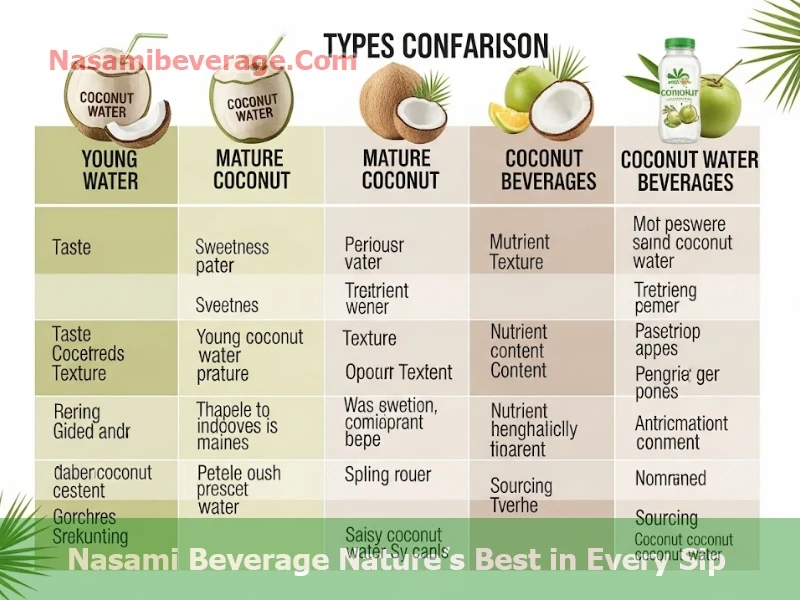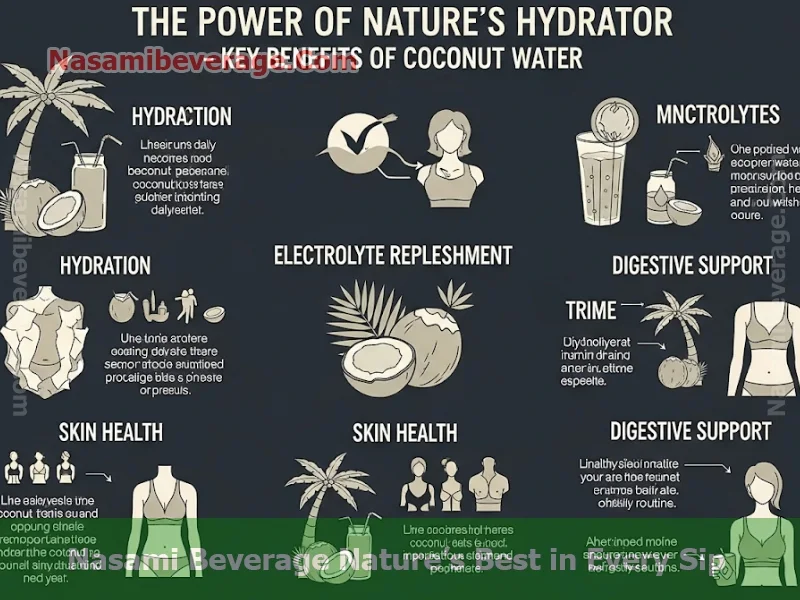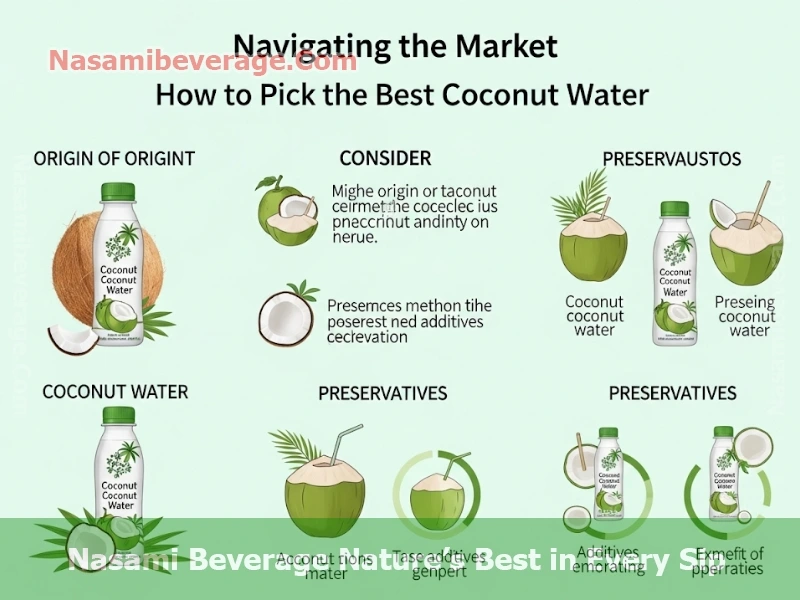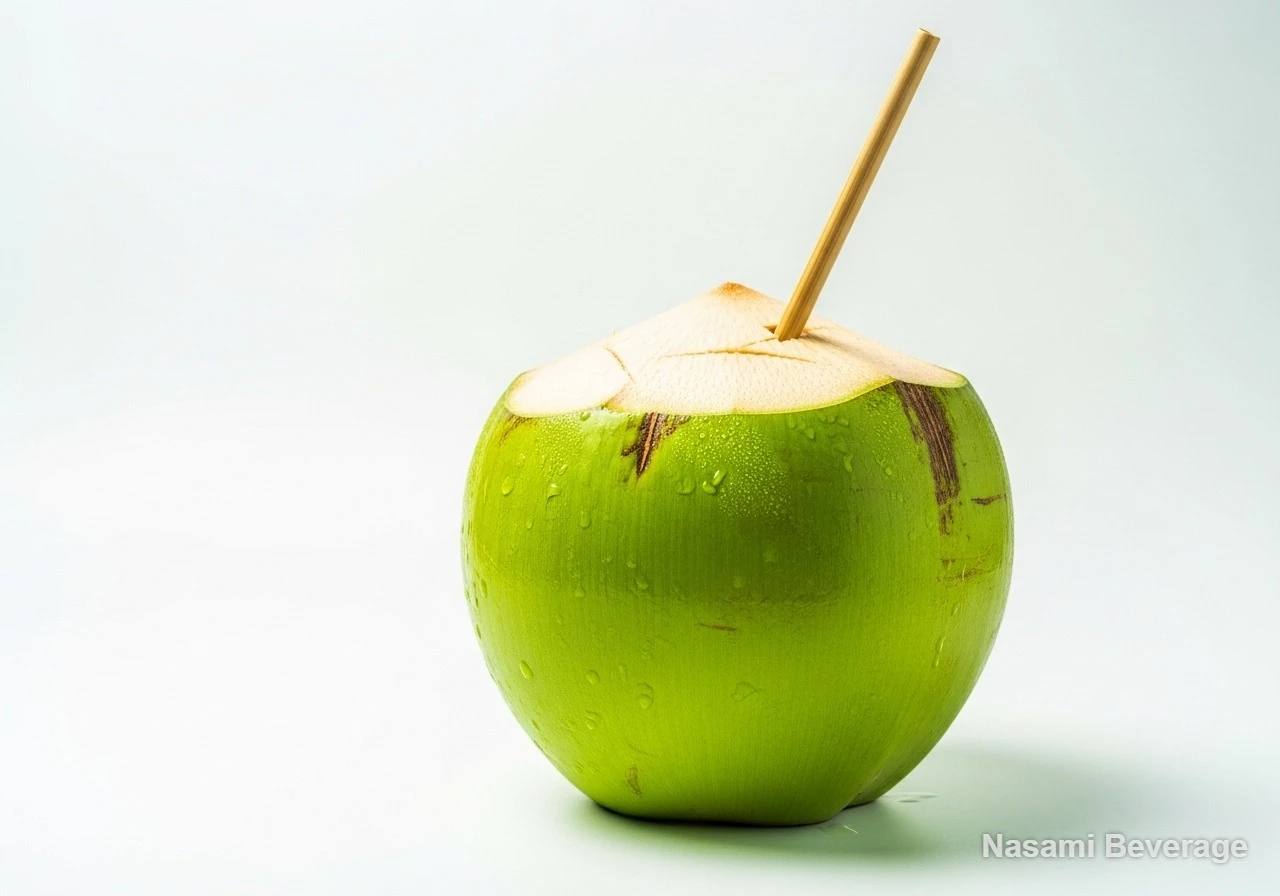When deciding what type of coconut water is best, the answer depends on its source and processing. From young, fresh coconuts to raw or organic packaged options, each choice impacts taste and nutritional value. This guide unveils the key differences to help you select the ultimate natural hydrator.
Unveiling the Different Types of Coconut Water
Not all coconut water is created equal. The source and processing methods significantly impact its taste, nutrient profile, and overall quality.
Young vs. Mature Coconut Water – A Nutritional Showdown
The most fundamental distinction in coconut water comes down to the age of the coconut itself. You’ll primarily find young coconut water in your cartons and bottles, and for good reason.
Young coconuts, typically green and harvested at 5-7 months of age, are brimming with clear, slightly sweet water. This water is celebrated for its delicate flavor and its rich concentration of electrolytes.
As the coconut matures, the water content decreases, and the liquid becomes less sweet and sometimes even a bit tart.
The flesh also thickens and hardens, eventually becoming the familiar white meat used for coconut milk and shredded coconut.
While mature coconuts still contain water, it’s generally not consumed as a beverage. The focus for drinking is almost exclusively on the tender, nutrient-dense water from young, green coconuts.
The Purity Debate – Raw, Organic, and Fresh Options
Beyond the age of the coconut, how the water is processed plays a huge role in its final form.

- Raw Coconut Water: This term typically refers to coconut water that hasn’t undergone high-heat pasteurization. Instead, it often uses High-Pressure Processing (HPP), a cold pasteurization technique that aims to kill harmful bacteria while preserving more of the natural enzymes, vitamins, and delicate flavor compounds. Many enthusiasts believe raw coconut water offers a taste closer to that straight from the coconut and retains a higher level of beneficial nutrients. Brands like Harmless Harvest are well-known for their raw, HPP-processed varieties, which can sometimes have a natural pink hue due to polyphenol oxidation.
- Organic Coconut Water: When you see “organic” on a label, it means the coconuts were grown without synthetic pesticides, herbicides, or genetically modified organisms (GMOs). Choosing organic options helps support sustainable farming practices and ensures you’re consuming a product free from potentially harmful chemical residues. Organic certification, such as USDA Organic, is a reliable indicator of quality and purity.
- Fresh Coconut Water: Nothing quite beats cracking open a fresh, young coconut and drinking its water directly. This is the purest form, untouched by processing, and offers the most vibrant flavor and highest concentration of natural enzymes. While not always practical for daily consumption, seeking out fresh coconuts at Asian markets or specialty stores is a delightful experience.
The Power of Nature’s Hydrator – Key Benefits of Coconut Water
Regardless of the specific type, coconut water offers a bounty of health benefits, primarily driven by its unique nutritional composition.
Coconut water’s claim to fame lies in its impressive electrolyte profile. Electrolytes are minerals that carry an electric charge and are vital for numerous bodily functions, including maintaining proper fluid balance, muscle contraction, and nerve signaling.
Unlike many sugary sports drinks, coconut water provides these essential minerals naturally:

- Potassium: Often lauded as the star electrolyte in coconut water, potassium is crucial for muscle function, maintaining normal blood pressure, and preventing cramps. A single serving can provide more potassium than a banana!
- Sodium: While typically demonized, a small amount of sodium is essential for fluid balance, especially during intense exercise when it’s lost through sweat.
- Magnesium: Important for over 300 biochemical reactions in the body, including muscle and nerve function, blood glucose control, and blood pressure regulation.
- Calcium: Known for bone health, calcium also plays a role in muscle contraction and nerve transmission.
This natural blend makes coconut water an excellent choice for rehydration after exercise, during illness (like a stomach bug), or simply to quench your thirst on a hot day.
It’s a fantastic, low-calorie alternative to sugary sodas and fruit juices. Beyond electrolytes, coconut water also contains antioxidants that help combat oxidative stress in the body, and some studies suggest it may support digestive health due to its natural enzymes.
Navigating the Market – How to Pick the Best Coconut Water
With so many choices available, making an informed decision about the best type of coconut water requires a bit of savvy.
Decoding Labels – Ingredients to Look For (and Avoid)
The golden rule for choosing high-quality coconut water is simple: read the ingredients list.
- Look for: “100% Pure Coconut Water.” Ideally, this should be the only ingredient.
- Avoid:
- Added Sugars: Many brands sneak in added sugars to enhance sweetness. Look for ingredients like “cane sugar,” “fructose,” “glucose,” or “syrup.” If the nutrition label shows more than a few grams of added sugar, put it back.
- Artificial Flavors: These additives are unnecessary and detract from the natural taste of coconut water.
- Preservatives: While some natural preservatives like citric acid (derived from fruits) are sometimes used in minimal amounts to maintain freshness, watch out for less natural ones. “Not from concentrate” is also a good indicator of minimal processing, meaning the water hasn’t been evaporated and then rehydrated, which can diminish flavor and nutrients.
- “From Concentrate”: This means the water was processed to remove most of its water content, then rehydrated later. While safe, it often results in a less vibrant flavor and potentially fewer nutrients compared to “not from concentrate” options.
Top-Rated Coconut Water Brands – Our Recommendations
Based on purity, taste, and sourcing practices, here are a few brands that consistently rank high:

- Harmless Harvest: Known for its raw, organic, and HPP-processed coconut water reviews from Thailand, often turning pink naturally. It has a fresh, slightly sweet taste.
- Taste Nirvana: Offers “premium 100% coconut water” sourced from young Thai coconuts, often praised for its clean, naturally sweet flavor.
- Zico: A widely available brand, Zico offers “100% coconut water” without added sugar. Check their specific varieties as some might have added flavors.
- Vita Coco: Another popular and accessible brand, Vita Coco also offers “100% pure coconut water.” They have different lines, so always double-check the ingredient list for added sugars or flavors.
- Amy & Brian: This brand focuses on single-ingredient coconut water with no added sugar, sourced from young coconuts.
Many of these brands also emphasize ethical and sustainable sourcing, a growing concern for many consumers. Look for certifications that indicate fair trade or environmentally friendly practices.
Beyond the Bottle – Maximizing Your Coconut Water Experience
Enjoying coconut water doesn’t have to be limited to simply drinking it from a carton. There are many ways to incorporate it into your healthy lifestyle.
While the convenience of packaged coconut water is undeniable, nothing quite compares to the experience of drinking it straight from a freshly cracked coconut.
- Fresh Coconut:
- Pros: Unbeatable taste, highest nutrient retention, fun experience.
- Cons: Limited availability, requires tools to open, short shelf life once opened. If you’re keen to experience truly fresh coconut water, seek out young, green coconuts at Asian markets. You can learn a guide to making coconut milk or simply how to open a coconut for its water.
- Packaged Coconut Water:
- Pros: Convenient, widely available, longer shelf life, portable.
- Cons: Processing (even HPP) can slightly alter taste and nutrient profile, risk of added ingredients if you don’t check labels.
For daily hydration and convenience, high-quality packaged coconut water is an excellent choice. For a special treat or a truly authentic experience, opt for fresh whenever possible. Some brands, like the best coconut water brands we mentioned, truly excel at capturing that fresh taste in a convenient package.
You can also use coconut water as a base for smoothies, mix it into cocktails, or even use it in cooking for a subtle tropical flavor. It’s fantastic for making refreshing popsicles or as a liquid base for chia seed puddings.
Whether it’s to aid post-workout recovery or simply to hydrate throughout the day, choosing the best type of coconut water ultimately comes down to understanding your preferences and prioritizing purity.
Frequently Asked Questions (FAQ)
What is the difference between young and mature coconut water?
A: Young coconut water, sourced from green coconuts, is typically sweeter, more abundant, and preferred for drinking due to its delicate flavor and electrolyte content. Mature coconuts have less water, which is often tarter, and are primarily used for their flesh to make coconut milk and oil.
Is raw coconut water better than pasteurized?
Raw coconut water, often processed using High-Pressure Processing (HPP) instead of high heat, is believed to retain more of its natural enzymes, vitamins, and delicate flavors compared to heat-pasteurized versions. While both are safe, many prefer raw for its perceived nutritional superiority and fresher taste.
What are the main electrolytes in coconut water?
Coconut water is naturally rich in several key electrolytes, including potassium, sodium, magnesium, and calcium. These minerals are vital for maintaining fluid balance, muscle function, and overall hydration.
Is coconut water good for post-workout recovery?
Yes, coconut water is an excellent choice for post-workout recovery. Its natural blend of electrolytes helps replenish those lost through sweat during exercise, aiding in rehydration and muscle function without the added sugars often found in traditional sports drinks.
What ingredients should I avoid in coconut water?
When choosing what is the best coconut water to buy, prioritize brands that list only “100% pure coconut water” as the sole ingredient. Avoid products with added sugars, artificial flavors, and unnecessary preservatives. “Not from concentrate” is also generally preferred over “from concentrate” for better taste and nutrient retention.
Navigating the world of coconut water becomes simple once you know the fundamentals. The real difference lies not just in whether the coconut is young or mature, but crucially, in how the water is processed and what ends up on the ingredient list.
By prioritizing purity-looking for single-ingredient, “not from concentrate” options-you empower yourself to choose genuine, nutrient-rich hydration. Ultimately, the most powerful tool you have is the ability to read and understand the label.
Now Nasami Beverage love to hear from your experience. Besides the brands we mentioned, have you discovered any hidden gems? Share your favorite brand of pure coconut water in the comments below!


